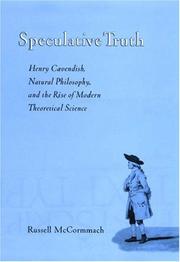| Listing 1 - 2 of 2 |
Sort by
|

ISBN: 0190289511 1280503092 0195347803 1602569223 9780195347807 0195186532 9780195186536 9780195160048 0195160045 9781280503092 9781602569225 9786610503094 6610503095 0197716431 Year: 2004 Publisher: Oxford New York Oxford University Press
Abstract | Keywords | Export | Availability | Bookmark
 Loading...
Loading...Choose an application
- Reference Manager
- EndNote
- RefWorks (Direct export to RefWorks)
McCormmach (history of science, U. of Oregon) offers an edition of 18th-century natural philosopher Cavendish's manuscript, in foul and corrected versions, on the mechanical theory of heat. He also explores physical theory in natural philosophy during the second half of the 18th century, of which the treatise is an example. Annotation 2004 Book New
Heat --- Physics --- Natural philosophy --- Philosophy, Natural --- Physical sciences --- Dynamics --- Electromagnetic waves --- Cold --- Combustion --- Fire --- Temperature --- Thermochemistry --- Thermodynamics --- History --- Cavendish, Henry, --- Chemists --- Chemists. --- Heat. --- Natuurwetenschappen. --- Physics. --- Thermodynamik. --- Cavendish, Henry. --- Whitman College --- Authors, Faculty. --- 1700-1799. --- Geschichte 1760-1810. --- Great Britain. --- Großbritannien.
Book
ISBN: 3319024388 331902437X Year: 2014 Publisher: Cham : Springer International Publishing : Imprint: Springer,
Abstract | Keywords | Export | Availability | Bookmark
 Loading...
Loading...Choose an application
- Reference Manager
- EndNote
- RefWorks (Direct export to RefWorks)
Profiles the eminent 18th century natural philosopher Henry Cavendish, best known for his work in chemistry and physics and one of the most baffling personalities in the history of science. In these chapters we are introduced to the psychology of science and of scientists and we learn about Cavendish’s life and times. His personality is examined from two perspectives: one is that he had a less severe form of autism, as has been claimed; the other is that he was eccentric and a psychological disorder was absent. Henry Cavendish lived a life of science, possibly more completely than any other figure in the history of science: a wealthy aristocrat, he became a dedicated scientist. This study brings new information and a new perspective to our understanding of the man. The scientific and non-scientific sides of his life are brought closer together, as the author traces topics including his appearance, speech, wealth, religion and death as well as Cavendish’s life of natural philosophy where objectivity and accuracy, writing and recognition all played a part. The author traces aspects of Cavendish’s personality, views and interpretations of him, and explores notions of eccentricity and autism before detailing relevant aspects of the travels made by our subject. The author considers the question “How do we talk about Cavendish?” and provides a useful summary of Cavendish’s travels. This book will appeal to a wide audience, from those interested in 18th century history or history of science, to those interested in incidences of autism in prominent figures from history. This volume contains ample relevant illustrations, several interesting appendices and it includes a useful index and bibliography. .
Physics --- Chemistry --- History --- Cavendish, Henry, --- Psychology. --- Physical sciences --- Natural philosophy --- Philosophy, Natural --- Dynamics --- History. --- Consciousness. --- Chemistry. --- History of Science. --- Personality and Social Psychology. --- History and Philosophical Foundations of Physics. --- Chemistry/Food Science, general. --- History, general. --- Apperception --- Mind and body --- Perception --- Philosophy --- Psychology --- Spirit --- Self --- Annals --- Auxiliary sciences of history --- Personality. --- Social psychology. --- Physics. --- Mass psychology --- Psychology, Social --- Human ecology --- Social groups --- Sociology --- Personal identity --- Personality psychology --- Personality theory --- Personality traits --- Personology --- Traits, Personality --- Individuality --- Persons --- Temperament --- 1700 - 1799
| Listing 1 - 2 of 2 |
Sort by
|

 Search
Search Feedback
Feedback About UniCat
About UniCat  Help
Help News
News